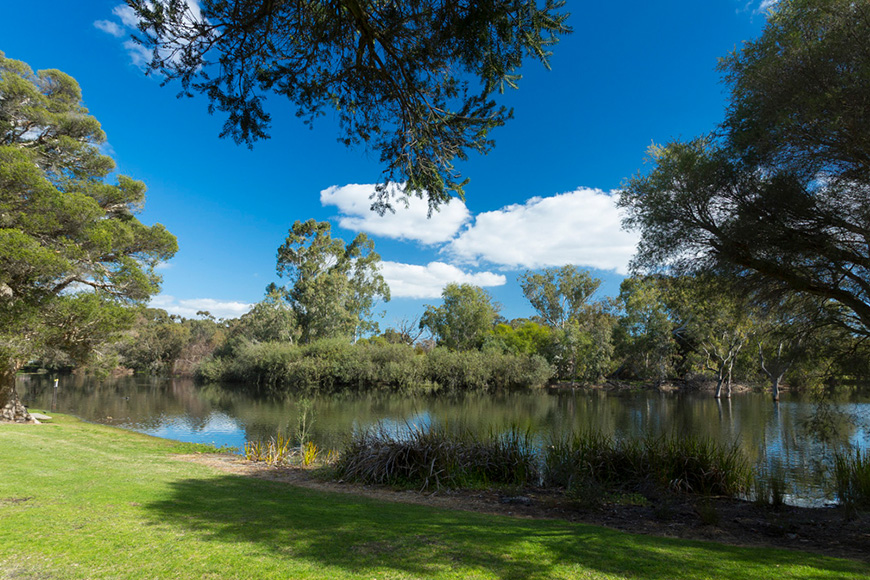Neil McDougall Lake
Background
Like many other wetlands and lakes across the Perth metropolitan area, Neil McDougall Lake experiences an almost yearly reccurrence of a dense Lemna (duckweed) mat that covers the lake. Blue-green algae blooms are also noted at the Lake when naturally occurring blue-green algae multiply quickly and dominate the water column.
A sustainable solution
The City is investigating a long-term, sustainable solution for the management of the duckweed and blue-green algae blooms.
The lake has significant environmental values and is visited by a variety of birds including the Western Swamp Hen, Pacific Black Duck, Eurasian Coot and Black Swan, as well as the Western long-necked tortoise, and the surrounding parkland is home to numerous passerines and small native Fauna.
Neil McDougall Lake acts as an infiltration basin and receives stormwater from four catchments, resulting in excess nutrients and organic loading entering the lake. High level of nutrients promotes algal blooms and low oxygen conditions, which in turn stress aquatic organisms. Other contaminants, such as heavy metals, also enter the lake through the drainage network and together with nutrients accumulate in the sediment. These can be released into the water column and enter the food chain.
The lake is shallow and has no outflow to promote flushing. As such there is an insufficient water movement to disrupt the blue-green algae growth cycle or to allow fringing vegetation to filter and remove nutrients.
Poor water movement and stagnation also lead to high temperatures in the water column in summer, which is one of the main factors fostering algal blooms.
An integrated remediation solution has been designed to address the processes driving the algae and duckweed blooms. This system addresses the continual inputs of polluted stormwater and poor lake circulation and is designed to operate with minimum maintenance requirements.
The system will also provide a range of additional benefits such as:
- Biodiversity enhancement and increased resilience
- Enhancement of the landscape and amenity values of the lake and surrounds
- Provision for nesting and shelters for native birds and animals
- Opportunities for environmental education.
Community consultation
In March 2019 the community were invited to provide feedback on the preliminary water sensitive urban design.
A feedback and outcomes report is available on Your Say South Perth. The design was updated taking on board the feedback along with the outcomes of environmental studies.
The design has now been finalised and design was completed mid 2020.
In early 2021 the City secured funds from the Local Roads and Community Infrastructure Grant funding for implementation of the construction of stage 1. Stage 1 construction is anticipated to commence in early 2022 subject to procurement.
Related documents

A sustainable solution for Neil McDougall Lake
The City has embarked on a project to provide a long-term, sustainable solution to manage nutrient levels in Neil McDougall Lake in Como.
The lake experiences an almost yearly reocurrence of a dense Lemna (duckweed) mat that covers the lake. Blue-green algae blooms are also noted at the Lake when naturally occurring blue-green algae multiply quickly and dominate the water column.
The City is investigating a long-term solution for the management of these duckweed and blue-green algae blooms and has developed a preliminary Water Sensitive Urban Design to help to reduce the level of nutrients before they enter the lake.
The lake is a receiving body of water for stormwater, and picks up nutrients from the surrounding catchment area which are then deposited into the lake. The duckweed feeds off this nutrient and coupled with warm weather, it flourishes.
The City has developed a preliminary Water Sensitive Urban Design to help to reduce the level of nutrients before they enter the lake.
A drop-in session will be held at Neil McDougall Park from 4-6pm, Thursday 7 March to inform the community about the preliminary design.
To provide your feedback visit, yoursay.southperth.wa.gov.au and complete the survey. Feedback closes 18 March 2019.
Contact us
- Phone 9474 0777

